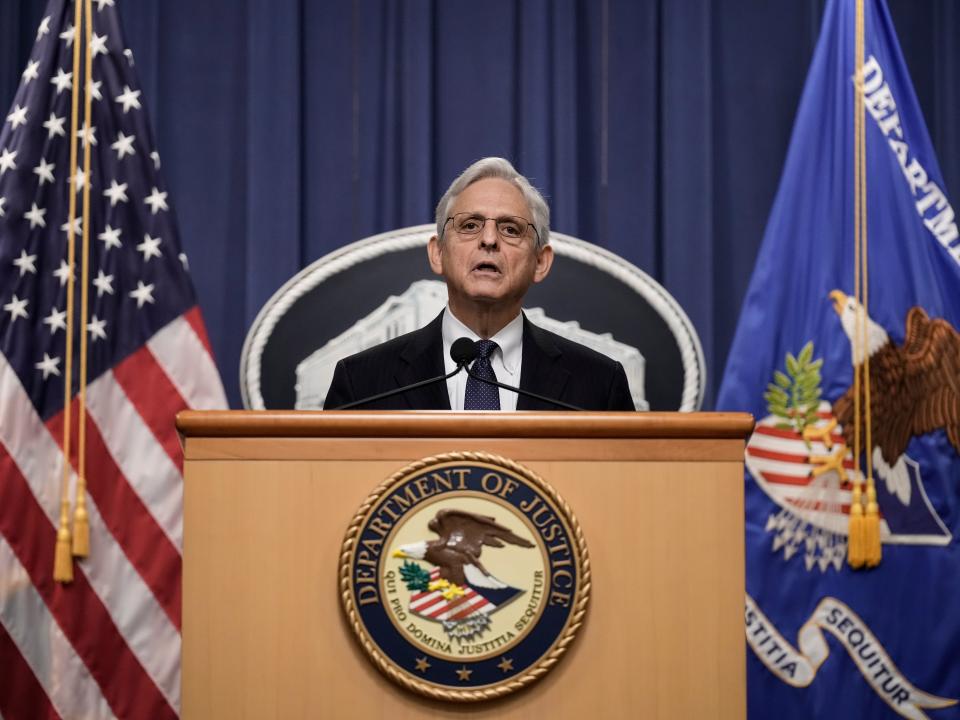AG Merrick Garland puts new restrictions on political activities as 2022 midterms near and Trump claims partisan bias

A new memo prevents all Justice Department employees from attending partisan political events.
The policy coincides with Donald Trump alleging that partisan bias motivated the Mar-a-Lago raid.
Merrick Garland said the new policy would help prevent even the appearance of political bias.
Attorney General Merrick Garland put new restrictions Tuesday on the political activities of Justice Department appointees, preventing them from attending fundraisers or campaign events as the 2022 midterms near and former President Donald Trump publicly claims partisan bias drove the FBI's recent search of his South Florida home.
In a memo, Garland said the tightened restrictions were aimed at helping the Justice Department "maintain public trust and ensure that politics — both in fact and appearance — does not compromise or affect the integrity of our work."
Under the Justice Department's previous policy, political appointees were allowed to attend partisan political events in their personal capacities, so long as they obtained permission in advance and participated only passively. But the new policy unveiled Tuesday forbids political appointees from attending such events in any capacity, making them subject to the same rules that apply to the Justice Department's career staff.
"In the past, when the department has further limited attendance at partisan political events during presidential election years, it has allowed an exception for non-career appointees who had close family members who were running for partisan offices, or similar situations," Garland wrote in a memo to Justice Department staff. "The new policy permits no exceptions."
Garland added that he was similarly making no exceptions for election night events, which political appointees were permitted to attend under the prior policy.
"I know you agree it is critical that we hold ourselves to the highest ethical standards to avoid even the appearance of political influence as we carry out the department's mission," Garland wrote. "It is in that spirit that I have added these new restrictions on political activities by non-career employees."
Garland's memo accompanied an admonition the Justice Department regularly issues to its staff in election years reminding them of the Hatch Act, a federal law that broadly prohibits government employees from engaging in political activities in their official capacities. It made no mention of Trump, but coincides with scrutiny of the FBI's search of Mar-a-Lago and the former president publicly claiming that the raid of his South Florida home was motivated by politics.
In a lawsuit, Trump's lawyers described the search as "unprecedented and unnecessary" and referred to the former president repeatedly as the "clear frontrunner" for the Republican nomination in 2024.
"Politics cannot be allowed to impact the administration of justice," Trump's lawyers wrote in a lawsuit requesting a court order to stop the Justice Department from continuing its review of records seized from Mar-a-Lago.
Trump's lawyers argued that Judge Aileen Cannon should halt the review until she appointed a third party — known as a "special master" — to determine whether any documents are covered by attorney-client privilege, executive privilege, or similar legal doctrines. In a weekend order, Cannon said she was inclined to grant the request for a special master.
The Justice Department said in a court filing Monday that it completed its review of potentially privileged documents and identified "a limited set of materials that potentially contain attorney-client privileged information."
In previous court filings, the Justice Department said it seized more than two dozen boxes of records — including some that were highly classified and marked as top secret — during the August 8 search of Mar-a-Lago.
Trump previously turned over 15 boxes of records in January to the National Archives. In a preliminary review, the FBI "identified documents with classification markings" in 14 of the 15 boxes, according to an agent's affidavit, which was unsealed with redactions on Friday.
While his lawyers have argued in court, Trump has taken to social media to attack the Justice Department's investigation into his handling of government records.
"Presidential Records Act was fully adhered to by me, but not by the FBI. They RAIDED my home (4th Amendment anyone?)" Trump wrote.
"Agent In Charge was just walked out of the FBI Headquarters Building for wrongdoing," he added, in an apparent reference to a top FBI official who resigned late last week after coming under fire for his role in investigations connected to President Joe Biden's son Hunter.
For Garland, the intensifying scrutiny of the former president and the current president's son presents a test fraught with political peril. Since taking office in March 2021, Garland has prioritized removing the Justice Department from the turmoil of the Trump era and pledged to "follow the facts and the law" in investigations touching the former president, namely an inquiry into efforts to overturn the 2020 election.
Read the original article on Business Insider

 Yahoo Finance
Yahoo Finance 